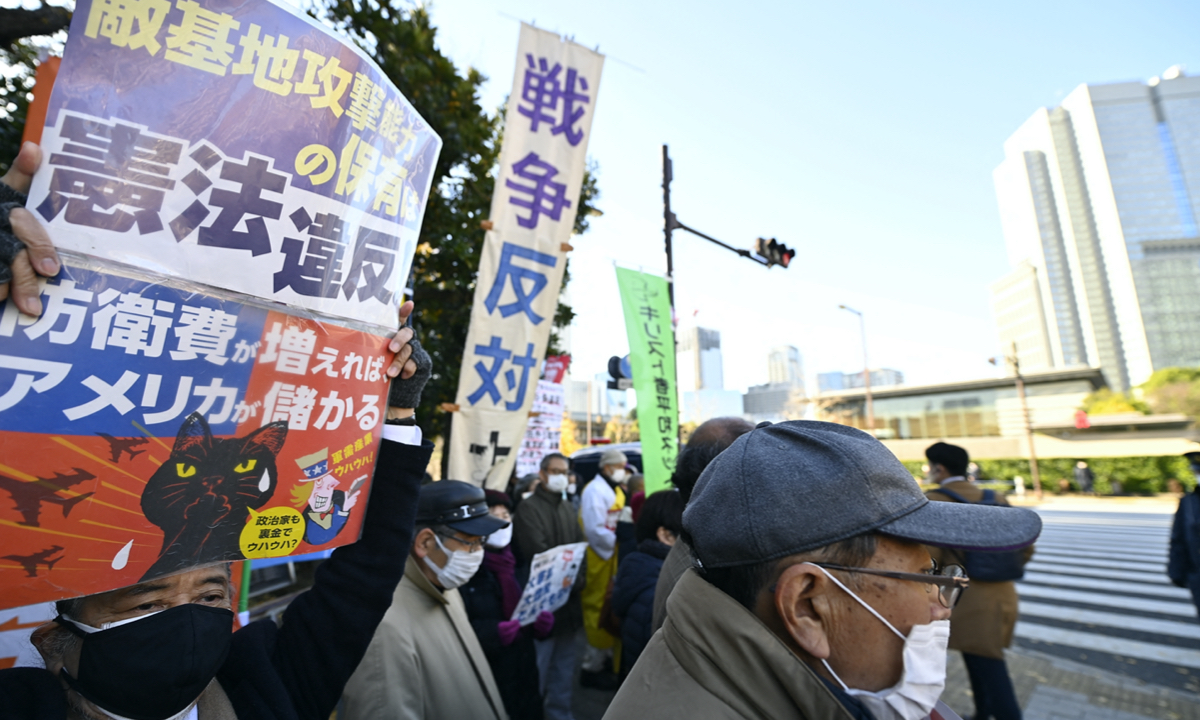Biden-Kishida summit faces backlash in Japan for potential defense cooperation upgrade

People gather outside Japanese Prime Minister Fumio Kishida's office holding placards denouncing the violation of Article 9 of the Japanese Constitution in Tokyo on December 16, 2022. Photo: AFP
At a time when the Fumio Kishida administration is facing a governance crisis, the Japanese Prime Minister stopped by the White House Tuesday evening ahead of Wednesday's official visit that is focused on a "historic" upgrade to the US-Japan defense ties to contain and suppress China.
Analysts said that the upgrading of the US-Japan alliance during Kishida's term will be undoubtedly an important achievement, which will help his reelection as the ruling Liberal Democratic Party (LDP) president.
However, the aggressive military ties face a backlash in Japan with protests and rallies held in the country to voice local people's opposition to the US-Japan summit as the public fears Japan is turning into a belligerent country again.
Kishida, making the first state visit of a Japanese leader to the US since Shinzo Abe in 2015, will also follow his late predecessor in delivering an address to a joint session of Congress on Thursday, the Japan Times reported on Wednesday.
Reuters on Wednesday reported that the US and Japan have hammered out about 70 agreements on defense cooperation, including moves to upgrade the US military command structure in Japan to make it better able to work with Japanese forces in case of a crisis.
The Reuters report revealed that Kishida is scheduled to join Biden and Philippines President Ferdinand Marcos Jr for a meeting anticipated to focus on South China Sea issues.
On Wednesday, Mao Ning, spokesperson of the Chinese Foreign Ministry, stated that some countries outside the region, led by the US, are constantly forming small circles in the South China Sea, using cooperation as a cover for confrontation, using peace as a pretext to flex their muscles, and using order as an excuse to create chaos.
This is a blatant act of hegemony. The intervention of any external forces will not affect China's determination and will to defend its territorial sovereignty and maritime rights and interests, the spokesperson said.
The US and Japan are trying to take advantage of the situation to win over the Philippines, while the Philippines is using the US and Japan to boost its courage, Da Zhigang, director of the Institute of Northeast Asian Studies at the Heilongjiang Provincial Academy of Social Sciences, told the Global Times on Wednesday.
The three countries intend to institutionalize security cooperation through this meeting, Da believes.
By holding a trilateral summit, it is clear that they are seeking to use the Philippines as a pivot to leverage the differences and disputes among countries in the region, thereby forcing Southeast Asian countries to take sides, analysts said.
In the US strategic layout of containing China, Japan is actively taking on a leading role, according to analysts.
Kishida's US visit comes at a time when support for his cabinet has been continuously low with the latest poll showing that the approval rating for Kishida's cabinet dropped to 23 percent. The visit is seen as a "lifeline" for Kishida aimed at showcasing diplomatic achievements to regain domestic support.
However, the Japanese public appear not to be buying the trick.
The Global Times learned that there are recently several rallies held in Japanese cities such as Tokyo and Kyoto to protest against the summit.
A Tokyo-based resident who requested anonymity told the Global Times on Wednesday that he recently saw a protest against the US-Japan summit along the street in the Japanese capital with some protesters urging Kishida to step down because the Kishida cabinet has actively promoted the country to join the US, the Philippines and Australia in the military exercise.
The Japanese resident said he knows little about politics but he is still worried about Japan's future if some politicians are desperate to fan flames of potential conflicts in the Asia-Pacific region.
China's state broadcaster CCTV reported a Japanese protest on Tuesday. According to CCTV, a Japanese resident said "it is absolutely intolerable to put all resources into war and military affairs regardless of the difficulties in medical care and people's livelihood… I think Japan is really turning into a belligerent nation, and I have a strong sense of crisis about it."